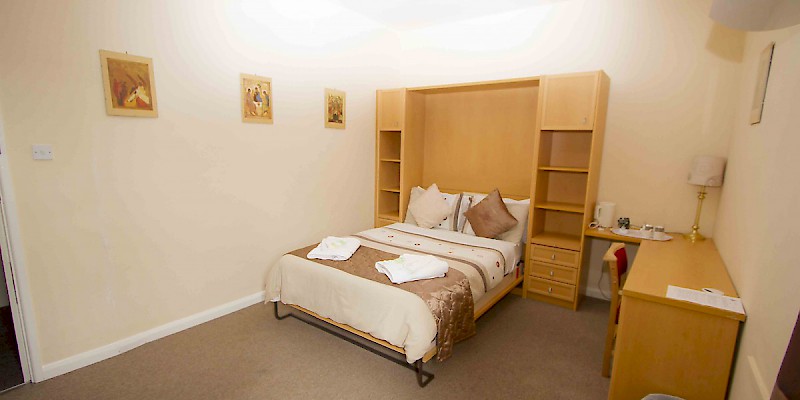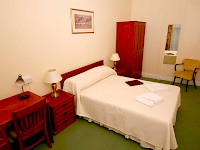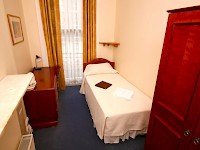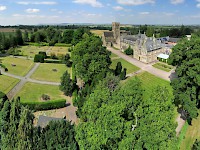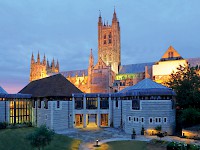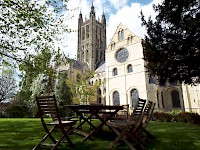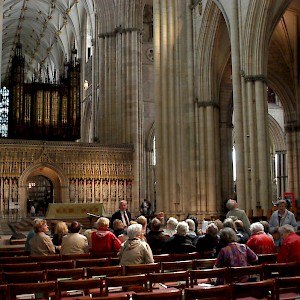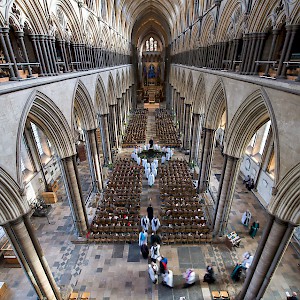Stay in a monastery or convent
Sleep in a religious guesthouse or retreat at abbeys, monasteries, priories, and convents across the U.K. from just £45
Many religious orders take "hospitality" as one of their rules, along with their vows of poverty and charity and the like.
That has led many of the to run guest houses—sometimes since the middle ages—which are set up and administered something like a bare-bones hotel.
Not only is a monastery, abbey, or convent stay one of the ultimate budget lodging options, it's also a great cultural experience—and a chance to get yourself out of your own head for a day or two, no matter what your religious affiliation or beliefs.
What is a religious hospice guest room like?
Expect small rooms, battered functional furnishings, and a décor that, at its most lavish, includes both a tiny print of the Virgin and a crucifix nailed to the wall above your bed.
Amenities will be similarly spare: a TV or telephone in your room will be rare—though private bathrooms are surprisingly common, though not guaranteed.
Accommodations may be in a special wing of the monastery complex set aside for visitors, or in a dorm-like room of bunks, or even an unused monk's cell.
As to the sleeping arrangements, the Brady Bunch bedroom revolution hasn't hit convents. Like a 50s sitcom, the beds are narrow twins with a healthy, holy amount of space between them.
Double beds are only occasionally an option, and even then only for married couples (in fact, many convents will not allow an unmarried couple to share a room).
How much does cost to stay in a convent?
Lodgings vary widely, from a simple seminary dorm room in London (from £50) to the upscale Cathedral Lodge at Canterbury (from £85), countryside Benedictine abbeys (from £60) to island monastery retreats in Scotland and Wales (you often pay by donation; figure £70–£80 for all meals and a room).
Religious guesthouses in the U.K. charge rates anywhere from $50 to $200 for a double, but most prices for a double room hover in the $80 to $120 range—prayers for your immortal soul included.
Many include or offer full board (all meals)—in addition to a cheaper B&B option—designed for the guests seeking more of a religious retreat than simply a intriguing and inexpensive place to stay.
What is a monastery stay like?
Though pilgrims predominate, guests of all faiths (or none) are welcome. You are usually invited, though not required, to attend services and the calls to hours in the chapel.
There are plenty of rules: respect the monks, be fairly quiet, arrive for meals promptly, check in and out at the appointed times, and be back in your room (or at least in the guest wing) by curfew, which may be as early as 9:30pm.
Some have a minimum-stay requirement (usually two or three nights; a few require you to stay a "week," which may mean anywhere from five to seven nights)
In exchange for all this, you get a cultural exchange program at bargain-basement prices. Regardless of your own religious persuasion, this is an unparalleled opportunity to sample a bit of the monastic life and experience the quiet, reflective solitude of strolling the cloisters and gardens.
If nothing else, a monastery stay can be a welcome break from the hurly-burly of touring endless museums and cathedrals.
Are there any rules for staying in a religious guest house?
Nuns, friars, ministers, and priests are like anybody else. Some are kindly; some are sourpusses.
The best strategy is to treat them with respect and a smile, and accept with good grace their many rules, like curfew (usually falls between 10pm and midnight), early checkout (often by 10am), and keeping relatively quiet (24/7).
Absent any specific rules, religious guesthouses simply expect you to respect the community and its values—be quiet, attend major masses, avoid throwing keg parties, that sort of thing. Also, don't blow in and out overnight basically just using them as a cheap place to crash.
Why should I consider staying in an abbey, friary, or monastery?
For the faithful, a religious hospice stay holds many rewards, not least of which is getting a chance to commune with your spiritual siblings from other lands.
Also, they're cheap.
However, here I'm going to speak to my fellow non-believers out there for a moment. You don't have to have faith to find a religious stay fascinating.
Aside from the (generally) low prices, convents and monasteries offer an interesting cultural experience—particularly in Europe, where they've been part of the fabled fabric of local communities since the Middle Ages.
After all, you spend much of your time in Europe admiring frescoes in historic churches, and paintings in museums, filled with nuns and monks scurrying about, observing their daily devotions, witnessing major historical events, or simply kneeling in adoration of the central saint. These works of art are a window into a tradition that's remained largely unchanged for centuries. Staying at a convent is like stepping through that window and into the fresco for a day or two. Pretty cool, huh?
Even if you aren't jazzed by the anthropological experience of it all, you can always use this is as an excuse to take a day or two to empty your mind and cleanse your soul. Wander the gardens. Sniff the flowers.
If invited, eat in the refectory with the residents (picture filling, simple, family-style meals served by smiling lay sisters and brothers).
Contemplate the country you've been visiting, your life, God, that itchy rash that developed since you stopped washing out your clothes every night, whatever.
More on religious travel
- Goodnightandgodbless.com - Trisha Clark, author of the Good Night and God Bless guidebooks, also runs a website with links to hundreds of monasteries and convents that take in guests—mostly in Europe (including England, Scotland, Wales, and Ireland), but also in Africa, Austrlaia, Thailand, and the USA.
- Franciscans.org.uk - A half-dozen Franciscan monasteries in England offer accommodation on a donation basis (For Central London? They suggest £30 bed and breakfast.)
- Benedictines.org.uk - Ten abbeys across England, most of which have guesthouses or lodges.
- Lodging in England's Monasteries - A slightly out-of-date guidebook (last published 2009), called Lodging in England's Monasteries: Including Ireland, Scotland and Wales by Eileen Barrish. Good resource if you are serious about this.
- Europe's Monastery and Convent Guesthouses - Another slightly out-of-date guidebook (last published 2008), Europe's Monastery and Convent Guesthouses: A Pilgrim's Travel Guide by Kevin Wright.
- You can't beat a religious retreat - A 2007 article in The Daily Telegraph reviewing eight intriguing religious retreats and holy guest houses across the U.K.
- Thefriars.org.uk - A Carlemite Priory in Aylesford.
- Good Night & God Bless II - Yet another slightly musty guide to religious logdings. Last published in 2009: Good Night & God Bless [II]: A Guide to Convent & Monastery Accommodation in Europe - Volume Two: France, United Kingdom, and Ireland by Trisha Clark (whose website, above, is kept a bit more up-to-date)
- infohub.com - Various spriritual tours in England, Scotland, and Wales, from walking in the footsteps of the saints to exploring pre-Christian Celtic traditions and Alban mysticism.Partner
- Economytravel.com - A well-regarded budget airfare booking site that has a special section devoted to missionary and pilgrimage consolidator fares as well as a groups department adept at helping missionary groups (of 10 or more people) arrange their trips.
- Unitours.com - Specialist in Catholic pilgrimages (which, naturally, means Ireland and Northern Ireland, but not so much England or Scotland).
- Glory-tours.com - Tour company specializing in overseas religious tours and pilgrimages, including an escorted England, Scotland, and Ireland trip.
- Christian-travelers-guides.com - Website run by Irving Hexham—a professor of Religious Studies at the University of Calgary—with a sampler of sections from his "Christian Travelers Guides" books to Italy, France, Germany, and Great Britain.
- Reformationtours.com - Christian and cultural tours of Europe and the Bible Lands, focused (as the name suggests) on Protestant sights and traditions.
- Arttoheartweb.com - Intriguing take on cultural tours in Europe's great art cities: "A new way to look at art... a new way to see God. The spiritual power of music is well known. The mission of Art to Heart is to reveal the power of visual art - to inspire us; to direct our focus heavenward; to initiate an encounter with God."

